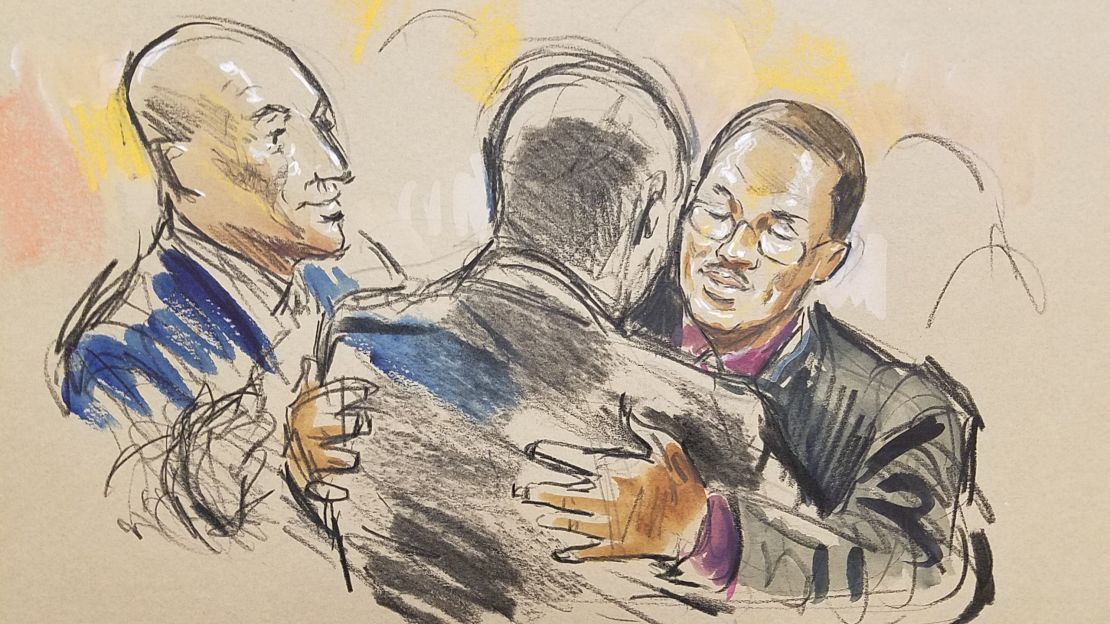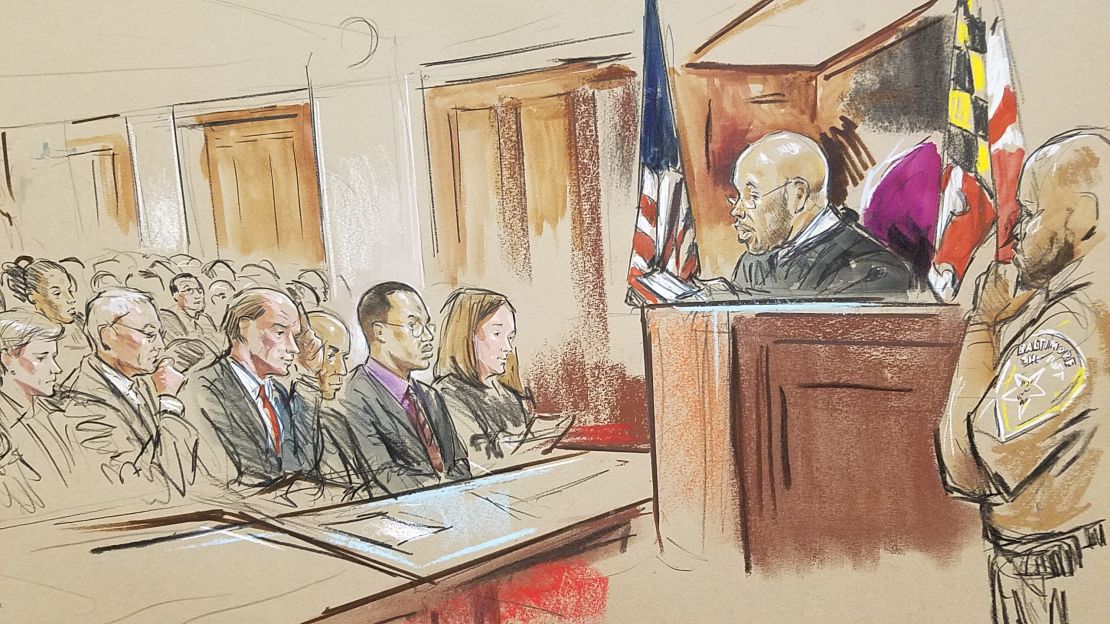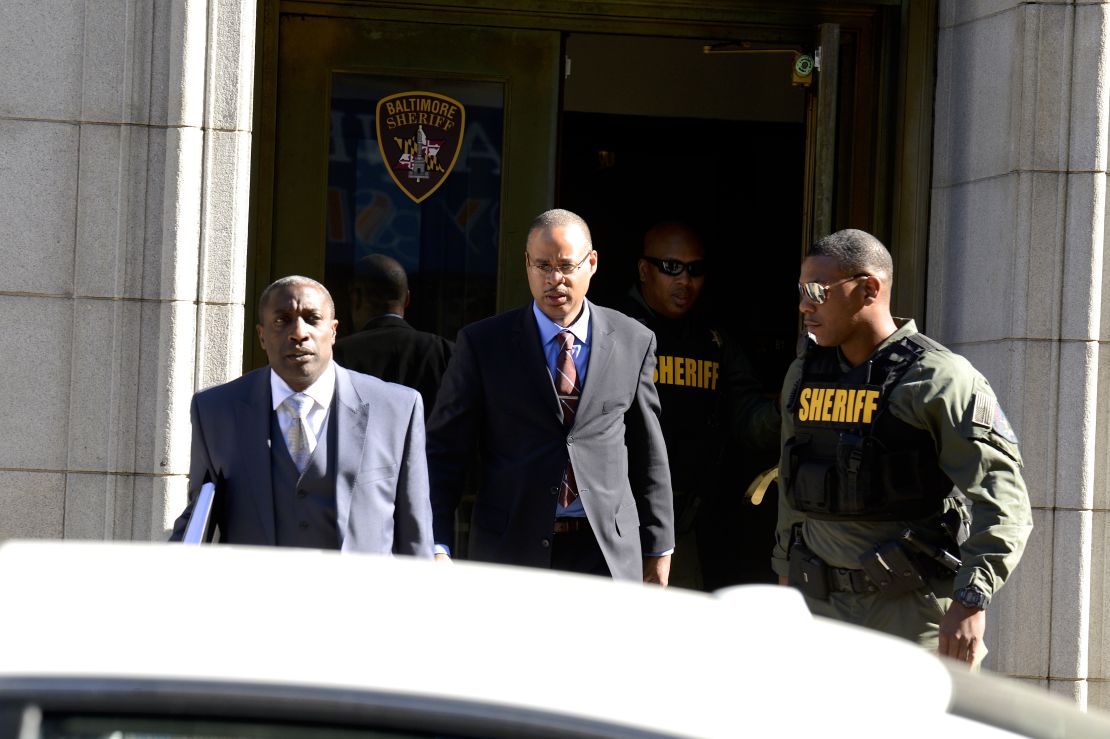Story highlights
NEW: Legal expert questions whether other cases will hold up
Caesar Goodson faced the most serious charges of the six officers arrested in the case
Baltimore police officer Caesar Goodson, who drove the van in which Freddie Gray was fatally injured, was found not guilty Thursday on all charges, including the most serious count of second-degree depraved-heart murder.
Wearing a dark suit and blue shirt, Goodson stood motionless as the verdict was read.
The officer’s daughter wept as the judge enumerated the reasons for the acquittal, count by count, over 40 minutes. Then Goodson embraced members of his family and legal team.

Gray, who was 25, suffered a devastating spinal injury and died in April 2015, about a week after he was arrested and placed into a prisoner van.
Though Gray’s death became a symbol of the black community’s distrust of police and triggered days of violent protests, the state has failed to secure a single conviction following three high-profile trials.
Three of the officers charged are white, three are black.
What this means for future trials in Gray’s death

The prosecution painted Goodson as one of the worst protagonists in Gray’s death.
But Judge Barry Williams disagreed, saying the state “failed to meet its burden to show that the actions of the defendant rose above mere civil negligence.”
Goodson also faced charges of second-degree assault, misconduct in office, involuntary manslaughter, manslaughter by vehicles (gross negligence), manslaughter by vehicle (criminal negligence) and reckless endangerment.
Four other officers await trial, but legal experts are now questioning whether those cases will hold up.
“It does not bode well for prosecution,” CNN legal analyst Danny Cevallos said.
The verdict “sends a message to the public and to the courts and the prosecution that if you can’t convict beyond a reasonable doubt as to a high charge like murder, what does it say about lesser crimes?”
In court Thursday, Baltimore officer Edward Nero, who was also acquitted in May of assault and other charges by the same judge, clasped his hands and said, “Yes!”
A smattering of protestors carried signs outside the courthouse after the verdict. They were outnumbered by sheriff’s deputies and members of the media.
The verdict is another setback for State’s Attorney Marilyn Mosby, who dramatically announced the charges against the six officers last year from the broad steps of the downtown War Memorial. She shook and bowed her head as the judge delivered the verdict.
Mayor Stephanie Rawlings-Blake called for calm in the community, saying that Goodson still faced an administrative review from the police department.
“I am proud that we as a community have come together to move our city forward over the past year,” she said.
Attorney Billy Murphy, who represents Gray’s family, told reporters Thursday evening the family was “angry and frustrated” that no officers have been brought to justice in connection with their son’s death. The family continues to support Mosby and urged for calm, he said.
Murphy also called for cameras to be allowed in the courtrooms in order to prevent “rumor and speculation and innuendo.”
“The anger in this community is in part based on the public’s inability to know,” he said.
The city awarded Gray’s family a $6.4 million settlement, averting a protracted civil court battle.
The ‘rough ride’

Prosecutors alleged that after Gray was arrested on a weapons charge, Goodson took him on a “rough ride” in a prisoner van – a punitive measure police used against unruly subjects.
They said Goodson drove so erratically that he blew through a stop sign and veered into another lane of traffic because of the speed he was traveling – which prosecutors claim would have tossed Gray around in the van. This is the point in the ride that prosecutors think Gray sustained his fatal spinal injury.
But Williams dismissed the “rough ride” theory as “inflammatory” and said the state failed to produce evidence of erratic driving or even excessive speed by Goodson. That the officer failed to put a seat belt on Gray, Williams said, does not prove that he intended to take him on a rough ride.
“The State wants this Court to simply assume that because Mr. Gray was injured, and the defendant failed to seat belt him after stop 2, allegedly ran a stop sign, and made a wide right turn, that the Defendant intentionally gave Mr. Gray a rough ride,” Williams said.
The prosecution also argued that Goodson neglected to provide Gray with proper medical assistance after Gray said that he wanted to go to the hospital.
Again, Williams disagreed, saying the officer had no way of knowing the “acute distress” Gray was in at the time.
“How would the average officer without medical training know the severity or the acute distress Mr. Gray was in?” asked Williams, a former prosecutor who investigated police misconduct cases for the U.S. Justice Department. “The State has not proven, beyond a reasonable doubt, that Gray was in need of medical attention.”
The bench trial featured clashes between prosecutors and members of the police department, who accused each other of misconduct in the highly sensational case.
In a statement, Gene Ryan, local president of the Fraternal Order of Police, urged that Mosby “reconsider her malicious prosecution against the remaining four officers.”
“We are more than certain that they, too, will be found to be without guilt,” he said, accusing the prosecutor of “playing politics” with the police department.
But Tessa Hill-Aston, president of the Baltimore City branch of the NAACP, said the fact Williams found said no evidence of a “rough ride” in the case did not mean the practice doesn’t exist. On Twitter, her organization called the court decision “a wakeup call for Baltimore.”
“Freddie is dead, and there’s no justification for him being dead,” she told CNN.
The Rev. C.D. Whitherspoon, a community activist, told CNN affiliate WBFF that the state’s inability to convict a single officer represented a failure of the judicial system.
“We knew and they knew that this case was critical to the remaining cases,” he said.
Goodson’s defense
Defense attorneys for Goodson argued that there is no evidence of that rough ride and that Gray’s injuries were caused in part by his own agitation and thrashing around in the van.
They said Gray was combative and uncooperative and that Goodson used his judgment to not put a seat belt on Gray because he felt it wasn’t safe.
“We certainly don’t want to speak poorly about the deceased, but Mr. Gray created the high-degree of risk,” defense attorney Matthew Fraling said during the bench trial.
The defense added that, although he asked to go to the hospital, Gray never showed symptoms that would have called for immediate medical attention, such as bleeding, bruising or broken limbs.
Over the seven-day testimony, the state called 21 witnesses; the defense called on nine. Goodson didn’t testify.
Williams will also preside over the upcoming trials of Officers Garrett Miller and Lt. Brian Rice next month. Sgt. Alicia White and Officer William Porter, whose initial trial ended in a hung jury in December, will be tried in the fall.
Gray’s death spawned protests that erupted on April 27, 2015 – the day of his funeral – into violent clashes with police and instances of looting and arson. Hundreds of people were arrested and more than 100 police officers were injured. City officials imposed a curfew, and the governor called in the National Guard to help restore order.
CNN’s Amanda Wills, Chris Boyette and Miguel Marquez contributed to this report.


